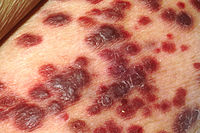
Photo from wikipedia
Kaposi sarcoma herpesvirus (KSHV)-associated multicentric Castleman disease (MCD) is a rare, polyclonal lymphoproliferative disorder characterized by flares of inflammatory symptoms, edema, cytopenias, lymphadenopathy, and splenomegaly. Diagnosis requires a lymph node… Click to show full abstract
Kaposi sarcoma herpesvirus (KSHV)-associated multicentric Castleman disease (MCD) is a rare, polyclonal lymphoproliferative disorder characterized by flares of inflammatory symptoms, edema, cytopenias, lymphadenopathy, and splenomegaly. Diagnosis requires a lymph node biopsy. Pathogenesis is related to dysregulated inflammatory cytokines, including human and viral interleukin-6. Rituximab alone or in combination with chemotherapy, such as liposomal doxorubicin, has led to an overall survival of over 90% at 5 years. Experimental approaches to treatment include virus activated cytotoxic therapy with high-dose zidovudine and valganciclovir and targeting human interleukin-6 activity. Despite successful treatment of KSHV-MCD, patients remain at high risk for developing non-Hodgkin lymphomas.
Journal Title: Hematology/oncology clinics of North America
Year Published: 2018
Link to full text (if available)
Share on Social Media: Sign Up to like & get
recommendations!